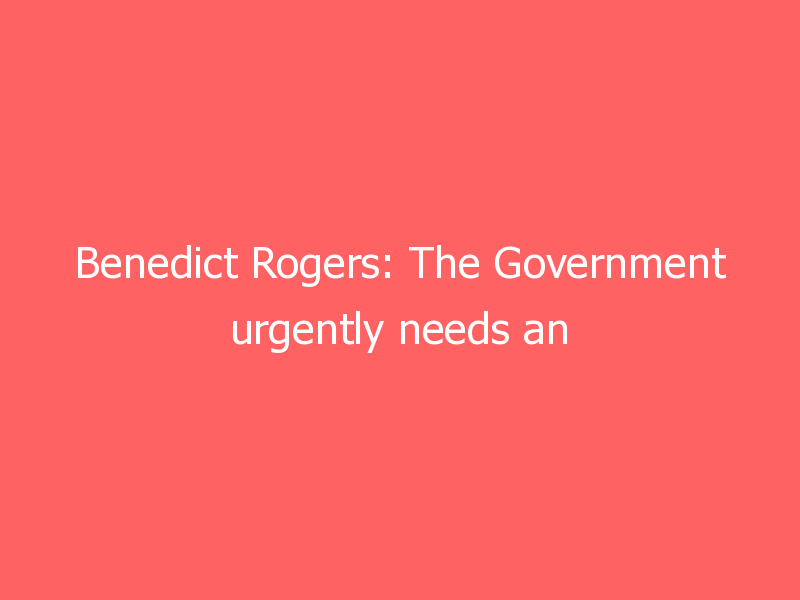Benedict Rogers: The Government urgently needs an integration plan for those fleeing oppression in Hong Kong

Benedict Rogers is a human rights activist and writer and a former parliamentary candidate. He is the co-founder and Chief Executive of Hong Kong Watch, co-founder and Deputy Chair of the UK Conservative Party Human Rights Commission and a member of the advisory group of the Inter-Parliamentary Alliance on China (IPAC).
On July 1 last year, Dominic Raab, the Foreign Secretary, announced one of the most courageous, generous and heroic expansions of immigration policy in post-Second World War history. With the backing of the Prime Minister and the leadership of the Home Secretary, both of whom deserve credit, he unveiled an offer to millions of Hong Kongers in their hour of need, telling them they could come to Britain, live, study and work here and be on a pathway to citizenship and security.
At the end of this month, in just a few days’ time, that offer becomes a reality. Covid-19 restrictions on our borders, quarantine and flightpaths may delay the flow, but without doubt a large number of Hong Kongers will take up the offer just as soon as they can. The expansion of the British National Overseas (BNO) passport right means that over five million Hong Kongers – those born before 1997 and their dependents – are eligible to come to the United Kingdom, to live here, buy or rent property here, find a job here and be on a “pathway to citizenship” that will enable them to settle here.
In the Home Office’s own terms, it’s a hybrid scheme – part humanitarian rescue, part migration. Those who qualify for BNO are not coming as refugees, but migrants and future British citizens. But some – those born after 1997, who include the most vulnerable young protesters in grave danger of political prosecution – are already coming to Britain too, in search of urgent sanctuary. We must be ready to support them.
The Government’s offer is generous and bold but for the potential of the scheme to be realised, we must now prioritise integration.
When thousands of Hong Kongers arrive at Heathrow and are waved through under the new scheme, what happens next? What preparations are in place for quarantine, how to help them find housing, jobs, schools for their kids, access to a GP? They have no recourse to public funds under the terms of the offer, but there is a need for a welcome pack and an integration plan.
A common misperception prevails that Hong Kongers are all wealthy, super-educated, entrepreneurial and speak great English: so no problem. I lived in Hong Kong for five years and have worked with Hong Kongers for almost 25 years, and I can tell you: most are dynamic, many are entrepreneurial, a good number are educated, but not all speak good English, some don’t have wealth and a few are very vulnerable. Helping them get up on their feet will not be onerous on the taxpayer, and the millions of pounds in capital which may arrive with them will doubtless be a boon, but those who choose to flee oppression in Hong Kong deserve a warm welcome and signposts to help them start their new lives.
We need a plan – from government and civil society. That’s why this week over ten civil society groups have signed a letter to Penny Mordaunt, the Paymaster General, who is coordinating the Government’s response, to call for one to be put in place.
This should draw on the extensive experience that civil society, churches, communities, families and individuals have of welcoming people to the UK: a society where people from around the world have found they can flourish. But government – in Whitehall and at local authority level – need a plan, and some resources, in place.
There should be an information hub for Hong Kongers when they arrive – for the immediate pandemic-related question of where they go for quarantine, and then the short-term question of what arrangements can be made for accommodation.
Then Government and civil society should work together to ensure that Hong Kongers are welcomed, and receive the advice they need to settle in – to find a doctor, a school, a job, a community and opportunities.
Given the chance, Hong Kongers will be a net gain for Britain’s economy and society. As a generalisation and in the long-run, they will be people with a “get up and go” spirit who will start businesses, create jobs and contribute to our professions. They will be doctors, nurses, lawyers, accountants and teachers who will bring talent to our public sector, or small business people who will begin enterprises that will bring dynamism to our economy.
To those in Britain who fear that a migration influx will “steal” jobs, I say that on the contrary they will create them. Some might even be recruited to our foreign and defence apparatus to bring linguistic and intelligence expertise to enhance our national security. The idea of a “charter city” for Hong Kongers, perhaps in the north of England, advanced by Lord Skildelsky, Lord Alton and others, could be further explored. All in all, it’s a moral and humanitarian policy that will result in a net gain for Britain. But only if done well because if implemented poorly – or with no planning at all – it could foster resentment and even Sinophobia.
Whitehall, local government, civil society and communities all have a part to play in welcoming Hong Kongers to Britain. That needs a plan, co-ordination and resources. Mordaunt must call an emergency cross-departmental ministerial meeting immediately, to put a plan in place to ensure that an historic offer doesn’t become an historic disaster.
Originally found on Conservative Home Read More








